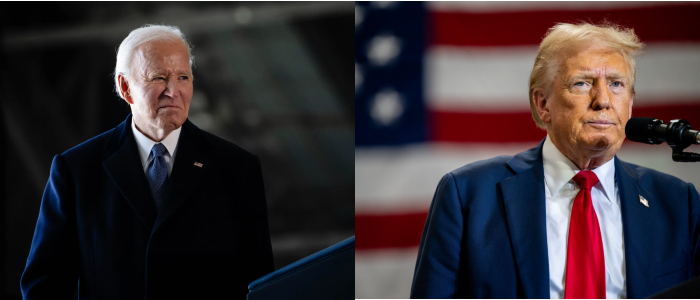Two major law firms faced judges Wednesday to ask for decisive relief from President Trump’s executive orders aimed at undercutting their business as retribution for representing his political adversaries. The firms, Perkins Coie and WilmerHale, say Trump’s orders “addressing risks” they purportedly pose to the country are unlawful and spell disaster for their ability to perform legal work involving the government. They’re among a small handful of Big Law firms fighting back against Trump’s pointed attacks on the legal industry, especially focused on those who have represented Democratic interests or are associated with attorneys the president believes are against him.
Six firms have been named in executive orders but only four have filed legal action challenging the directives: Perkins Coie, WilmerHale, Susman Godfrey and Jenner & Block. Other firms, targeted or not, have struck deals with the president to be spared or silently accepted the penalty. Perkins Coie, which has long drawn Trump’s ire for advising Hillary Clinton during her 2016 presidential campaign and working with an opposition research firm tied to the discredited Steele dossier, was targeted in an executive order early last month.

Trump directed various agencies to cut off its employees’ security clearances, access to federal government facilities and to review any contracts the government has with the law firm. U.S.
District Judge Beryl Howell temporarily froze key provisions of the order last month but weighed Wednesday whether to rule entirely in the law firm’s favor — or throw the case out altogether. She seemed strongly inclined to do the former. “Is this a throwback to the McCarthy era and the Red Scare era?” the judge asked the government, referencing the mid-20th century moral panic about communist and Soviet influence on American institutions that the late Sen.
Joseph McCarthy (R-Wis.) spearheaded. DOJ lawyer Richard Lawson argued that it’s within the president’s discretion to decide who to trust with the nation’s secrets.
The order was designed to assuage his concerns about Perkins Coie, he said. “We view this as not designed to punish,” Lawson said. But Howell pushed back against the notion that Perkins Coie was ever a threat, noting that the executive order says Trump’s determination was based on “the national interest,” not national security.
“Could the broader term include the fact the president doesn’t like them? Like the person? Like the group?” she pressed. Lawyers for Perkins Coie called Trump’s order “even more punitive” than the Red Scare referenced by Howell, suggesting it’s been “dressed up in sheep’s clothing” as a national security decision but is plainly retribution. “To me, it sounds more like national insecurity than national security,” lawyer Dane Butswinkas quipped about the order, which he described as straight out of the “playbook of authoritarianism.
” Less than an hour after Howell’s hearing concluded, Lawson faced U.S. District Judge Richard Leon, an appointee of George W.
Bush, to argue against WilmerHale’s separate bid for permanent relief from Trump’s order targeting it. The order against WilmerHale — which employed Robert Mueller before and after his stint investigating Russian interference in the 2016 presidential election as a special counsel — was signed in late March and imposes similar consequences to those against Perkins Coie, seeking to limit the firm’s government contracts and its employees’ security clearances and access to government buildings. Dozens of WilmerHale employees and supporters showed up at the federal courthouse in Washington, D.
C., for the hearing, drawing a line out the door that persisted until the proceeding had ended. Several carried small signs with statements of protest like “I am not executive ordered” and “Lawyers: FREEDOM to pick their clients.
” Neither judge on Wednesday ruled. The law firms asked for summary judgement in their favor and the government is asking to dismiss the law firm’s challenges to Trump’s orders. The judges could rule at any time.
Not all firms have fought back. At least nine law firms cut deals with Trump to provide tens of millions of dollars of free legal work on causes aligned with the administration in exchange for his mercy. Trump rescinded his executive order targeting the law firm Paul, Weiss after it agreed to dedicate the equivalent of $40 million in pro bono legal services to support administration initiatives; eliminate any diversity, equity and inclusion (DEI) policies; and not deny representation to clients based on their political views.
The order against Paul, Weiss had specifically mentioned Mike Pomerantz, an attorney who worked for the firm before joining the Manhattan district attorney’s office on the hush money criminal case against Trump. Lawson, the government lawyer, said that “trust in the holder” of security clearances is an essential facet of national security. “And $40 million in free legal services is enough for the president to trust Paul, Weiss again?” Howell asked.
The other law firms who have struck deals are Skadden, Arps, Slate, Meagher & Flom; Willkie Farr & Gallagher; Kirkland & Ellis; Latham & Watkins; Cadwalader, Wickersham & Taft; A & O Shearman; Simpson Thacher & Bartlett; and Milbank. In several of those instances, Trump had not yet issued an executive order targeting the firms — but the threat of one was enough to bring them to the bargaining table. Altogether, the president has extracted nearly $1 billion in pro bono legal services.
Butswinkas argued that the law firms’ deals with Trump prove that his orders have had a chilling effect on the industry. “These are some of the most talented lawyers in the world, with the most resources, and they chose silence,” he said. “That is the objective of these executive orders and proof that it worked.
” The Perkins Coie lawyer said he wouldn’t criticize the other law firms for their decisions to reach deals with the president, but Howell indicated that if he wanted to, he could. “History will take the pen on that narrative,” he replied..
Politics

Law firms fight for decisive relief from targeted Trump orders

Two major law firms faced judges Wednesday to ask for decisive relief from President Trump’s executive orders aimed at undercutting their business as retribution for representing his political adversaries. The firms, Perkins Coie and WilmerHale, say Trump’s orders “addressing risks” they purportedly pose to the country are unlawful and spell disaster for their ability to [...]















